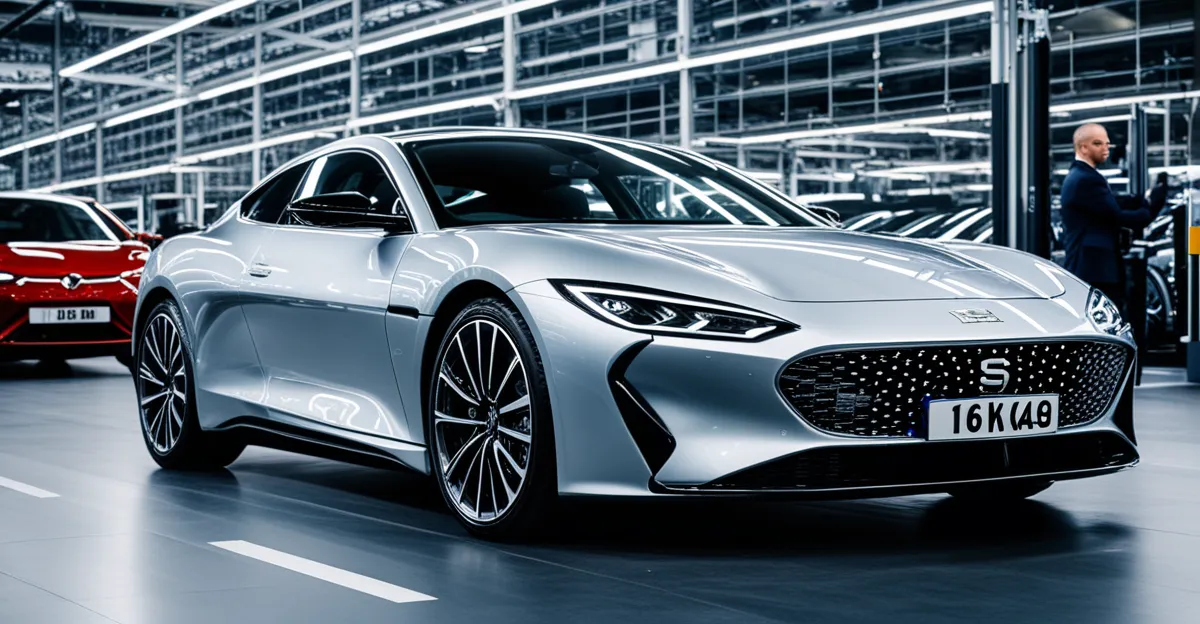How UK Automotive Innovations Set Industry Direction
The UK automotive innovation landscape consistently influences industry trends worldwide. Major breakthroughs in areas like electric drivetrains, battery technology, and autonomous systems have positioned the UK as a pivotal player in shaping the future of mobility. This leadership is not accidental; decades of focused research, investment, and collaboration between universities, private enterprises, and policymakers form its foundation.
The immediate impacts of these technological advancements are evident in UK manufacturing processes, which now integrate smart automation and advanced materials to enhance efficiency and reduce environmental footprints. Additionally, consumer behavior in the UK is shifting rapidly, with growing demand for vehicles that incorporate the latest innovations—such as connected features and cleaner powertrains—reflecting broader global trends.
In parallel : How Will the UK Automotive Industry Adapt to Growing Environmental Concerns?
By continuously pioneering new technologies, the UK automotive innovation sector sets standards that ripple through global markets. Staying abreast of these developments is essential for manufacturers and consumers alike, as they pave the way for safer, smarter, and more sustainable transportation solutions. The interplay between innovation and market adoption in the UK offers a clear example of how technological progress can drive industry transformation on a worldwide scale.
Key Advancements in Electric Vehicles and Clean Mobility
The surge in electric vehicles UK reflects a transformative phase in clean mobility. Rapid adoption of EVs has been propelled by innovative UK automakers introducing flagship models that combine performance with sustainability. These companies not only lead in vehicle design but also invest heavily in battery technology to improve range and charging speed.
Also read : How Are Electric Cars Influencing the UK Automotive Industry?
Supporting this growth, the development of widespread charging networks across the UK has addressed one of the biggest concerns for EV drivers: accessibility of fast, reliable charging points. Government incentives, including subsidies and tax breaks, encourage both manufacturers and consumers to invest in zero-emission transport options.
What makes the UK’s EV innovation distinctive is the alignment between industry efforts and public policy. Automakers benefit from regulatory frameworks that mandate emissions reductions, further accelerating the transition to electric vehicles UK. This synergy creates an ecosystem where technological advancements in EVs and infrastructure build momentum simultaneously.
Despite progress, challenges remain—such as the need for more affordable models and expanded rural charging stations. However, as the UK continues to pioneer clean mobility strategies, its role in shaping both domestic and global industry trends remains influential and promising.
Autonomous and Connected Vehicle Technologies
UK automotive innovation is at the forefront of autonomous vehicles and connected cars UK, driving smart transport solutions that promise to reshape mobility. Significant progress has been made in self-driving vehicle trials, with government-backed initiatives testing automated systems on public roads. These trials focus on safety, reliability, and integration with existing traffic environments—crucial steps before widespread adoption.
Integration of connectivity and smart systems is another key advancement. Connected cars UK enable real-time data exchange between vehicles and infrastructure, improving traffic management and enhancing passenger experience through features like predictive maintenance and advanced driver assistance systems. This interconnectivity supports the broader vision of smart transport solutions where vehicles operate seamlessly within intelligent networks.
Collaboration between industry leaders and government bodies accelerates innovation in this sector. Public-private partnerships fund research that combines technical expertise with regulatory support, enabling rapid technological advancements and addressing concerns related to cybersecurity, privacy, and legal frameworks.
Overall, the UK maintains a pivotal role in pioneering autonomous vehicle technology and connected cars UK, setting global benchmarks in safety, performance, and integration. This synergy between innovation and policy ensures the UK leads not just in developing technologies but also in creating the ecosystems necessary for their practical deployment.
Emphasis on Sustainability and Advanced Materials
Sustainability is a cornerstone of UK automotive innovation, illustrated by a focused shift toward sustainable automotive materials. UK manufacturers increasingly employ lightweight, recycled, and bio-based components, reducing vehicle weight and improving energy efficiency. These eco-friendly materials contribute significantly to lowering emissions throughout a vehicle’s lifecycle.
Beyond materials, eco-friendly manufacturing practices are becoming standard. UK automotive plants integrate energy-efficient technologies and adopt circular economy principles, minimizing waste and reusing resources. These efforts help decrease the carbon footprint of production processes, supporting the nation’s climate targets.
Leading UK firms exemplify this movement by pioneering green automotive practices through ongoing research and development. Their innovations range from advanced composites to biodegradable interior parts, demonstrating sector-wide commitment.
In summary, the push for sustainability in the UK automotive sector combines novel materials, cleaner manufacturing, and industry leadership. This holistic approach not only aligns with evolving industry trends but also positions the UK as a global role model in eco-conscious vehicle production, reinforcing its influence on international market standards.
How UK Automotive Innovations Set Industry Direction
The UK automotive innovation landscape has delivered technological advancements that drive industry trends globally. Breakthroughs in electrification, autonomous driving, and sustainable materials exemplify the sector’s cutting-edge contributions. These innovations have not only transformed vehicle design but also manufacturing processes, enhancing efficiency and environmental performance.
The UK’s role in shaping global automotive trends is pivotal due to its unique blend of research institutions, skilled workforce, and strong public-private collaboration. This ecosystem accelerates the translation of UK automotive innovation into real-world applications. For example, advances in electric drivetrains developed domestically influence vehicle architectures worldwide, while connected vehicle technologies from the UK serve as blueprints for global smart mobility solutions.
Immediate impacts of these innovations are visible in manufacturing, where automation and smart systems optimize production lines. Consumer behavior also shifts as demand grows for cars that feature the latest tech. This reflects an increasing preference for sustainable and connected vehicles equipped with advanced safety and efficiency features.
Overall, the UK’s leadership in automotive innovation continually sets benchmarks, ensuring that emerging technologies not only meet current needs but also anticipate future mobility challenges and opportunities.
How UK Automotive Innovations Set Industry Direction
UK automotive innovation has introduced transformative technological advancements that profoundly influence industry trends worldwide. Key breakthroughs include electrification, connected vehicle systems, and autonomous technologies. These developments not only enhance vehicle performance but also redefine manufacturing processes by embedding smart automation and advanced materials, boosting efficiency and sustainability.
The UK occupies a vital position in shaping global automotive trends due to its integrated ecosystem of research institutions, skilled engineers, and close cooperation between industry and government. This synergy accelerates the translation of innovations into practical applications that set benchmarks globally. For example, advances in electric drivetrain designs from UK innovators have been adopted widely, influencing vehicle architectures beyond domestic markets.
Immediate impacts of these innovations are evident in UK manufacturing plants, where automated production lines and digital workflows reduce costs and environmental impact. Concurrently, consumer preferences are evolving, with a noticeable shift toward vehicles equipped with cleaner powertrains and connected features. This change reflects broader market demand for sustainability combined with enhanced driving experiences.
Overall, the UK’s continuous commitment to innovation ensures it remains at the forefront of automotive evolution, fostering technological advancements that influence both market dynamics and future mobility solutions globally.
How UK Automotive Innovations Set Industry Direction
The UK automotive innovation landscape continues to drive industry trends through key technological advancements in electrification, autonomy, and connected systems. These breakthroughs extend far beyond product design, transforming manufacturing processes with automation and smart technologies that enhance productivity and sustainability.
The UK plays a vital role globally due to its integrated network of research institutions, skilled workforce, and strong industry-government collaboration. This network expedites the translation of invention into market-ready solutions that influence vehicle architecture and mobility concepts worldwide. For example, UK-led advancements in electric drivetrains have become foundational in global EV designs, while connected vehicle technologies pioneered in the UK set standards for smart transport ecosystems internationally.
Immediate impacts are noticeable in British manufacturing, where digital workflows optimize production efficiency and reduce environmental impacts. Simultaneously, consumer preferences shift toward vehicles featuring cleaner powertrains and advanced connectivity, reflecting increasing awareness of sustainability and tech integration. These evolving demands pressure manufacturers to innovate continuously.
In essence, UK automotive innovation does not merely follow trends but establishes them, shaping global industry directions by combining cutting-edge research, practical applications, and responsive market adaptation. This dynamic ensures the UK remains influential in defining the future of automotive technologies worldwide.





